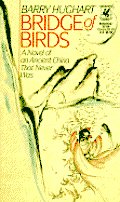
| Series: | Master Li #1 |
| Publisher: | Del Rey |
| Copyright: | 1984 |
| Printing: | May 1985 |
| ISBN: | 0-345-32138-3 |
| Format: | Mass market |
| Pages: | 278 |
"My surname is Li and my personal name is Kao, and there is a slight flaw in my character," said Master Li with a polite bow. "This is my esteemed client, Number Ten Ox."
Number Ten Ox is the tenth of his father's sons and is quite strong, hence his nickname. He lives in a village devoted primarily to silk-making. When a mysterious illness strikes down all of the children of the village between a particular age and destroys the silk production for the year, he travels to Peking to find a wise man to explain how a plague can count. The wise men on the Street of Eyes are far beyond his means, but finally a sign with a half-closed eye instead of the fully-open eyes of the wise men catches his gaze. Inside, he discovers Master Li in a drunken stupor, and a great partnership is formed, one that will take them through mythology, courts of power, and strange labyrinths in pursuit of a cure.
Bridge of Birds, subtitled "a Novel of an Ancient China That Never Was," is a deft blend of real Chinese mythology, exaggerated Oriental settings and phrasings from Western fascination and misunderstanding of China, a playful sense of humor, some tropes of detective fiction, and some Indiana-Jones-style adventure in magical treasure vaults. It's as compelling as it is difficult to describe. The closest comparison I have is to Ernest Bramah's Kai Lung stories; Bridge of Birds doesn't maintain a faux-Oriental style as consistently, but Hughart uses it in places to great effect. However, Bridge of Birds owes as much to detective novels, particularly the wise detective and active assistant tradition of Sherlock Holms or Nero Wolfe.
The mystery in this case is the cause and cure of the plague, and Master Li approaches it with a step-by-step deduction and occasional leap of insight that will be familiar to any mystery reader. The logic, though, is frequently a fantasy or medieval logic that adds in ghosts, elaborate spells, poisons, and magical plants (particularly the mandrake), and the mystery is crossed with an adventure-filled quest and blended with Chinese mythology, both true and manufactured.
Bridge of Birds doesn't have quite the density of faux-Chinese aphorisms as Kai Lung, but Hughart occasionally inserts an excellent one.
"'Take a large bowl,' I said. 'Fill it with equal measures of fact, fantasy, history, mythology, science, superstition, logic, and lunacy. Darken the mixture with bitter tears, brighten it with howls of laughter, toss in three thousand years of civilization, bellow kan pei — which means "dry cup" — and drink to the dregs.' Procopius stared at me. 'And I will be wise?' he asked. 'Better,' I said. 'You will be Chinese.'"
Humor is present throughout, but the most effective bits (for me at least) were the ruses and schemes that Master Li uses to either get money or get access to the next step of their quest. The setup for each scheme is funny in itself, but it's the wonderfully dead-pan narrative style and execution that made the book for me. Hughart uses the mannered and somewhat round-about narrative style to great effect for comedic timing and understatement. I always prefer humor where the reader can laugh without being pointedly told by the story that they're reading a joke, where the narrator doesn't obviously point out the humor but one can detect a twinkle in his eye. Hughart does this exceptionally well.
Like a lot of humor, I found it best in shorter doses. There's some repetitiveness to the structure and adventures; bits that might become tiresome when read in one sitting are fresher and more enjoyable spread across several.
Not every idea worked for me — I got a bit tired of Lotus Cloud and Number Ten Ox's obsession, for example, and there was rather a lot of angst over the children — but Hughart's writing has a rhythm and pacing that makes it a delight to read even through parts of the plot that didn't interest me. I highly recommend Bridge of Birds to anyone who likes humorous fantasy and protagonists who excel in adroit manipulation of any situation. It's an often-overlooked but well-deserved classic.
Followed by The Story of the Stone.
Reviewed: 2008-06-29